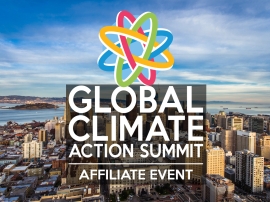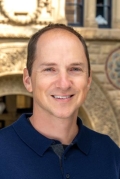
Read about the panel discussion.
Read Q&A with experts on climate and health.
The Global Climate Action Summit brought together leaders from state and local governments, business, and citizens from around the world, to demonstrate how the tide has turned in the race against climate change, showcase climate action taking place around the world, and inspire deeper commitments from each other and from national governments. The goal of the Summit was to demonstrate how much progress has been made on climate action since 2015 and how more is needed.
The Stanford Woods Institute for the Environment hosted an affiliated event featuring a discussion among experts about the decision by the U.S. Environmental Protection Agency (EPA) known as the Endangerment Finding. In December 2009, the EPA released official findings indicating six types of greenhouse gases endanger human health and welfare. This “Endangerment Finding” is an essential component of the legal basis for regulating greenhouse gas emissions as air pollution under the Clean Air Act, providing foundational support for important aspects of U.S. climate policy.
Recently, speculation that EPA may revisit the Endangerment Finding has been widespread, even though the legal basis for the finding has been robust. This event assembled a panel of scholars to review how the strength of the scientific evidence for endangerment has grown since 2009. Leading experts in the science of climate impacts discussed how this new evidence lends increased support to the conclusion that these gases pose a danger to the public health and welfare. Newly available evidence (1) strengthens the association between risk of some of these impacts and anthropogenic climate change; (2) indicates that some impacts or combinations of impacts have the potential to be more severe than previously understood; and (3) identifies risk of additional impacts through processes and pathways not considered in the endangerment finding.
PANEL
Marshall Burke, Assistant Professor of Earth System Science and Center Fellow at the Woods Insittute for the Environment, Stanford University
Noah Diffenbaugh, Kara J Foundation Professor of Earth System Science and the Kimmelman Family Senior Fellow at the Woods Institute for the Environment, Stanford University
Sherri Goodman, Senior Fellow at the Wilson Center’s Environmental Change and Security Program and Polar Initiative
David Lobell, Gloria and Richard Kushel Director of the Center on Food Security and the Environment, William Wrigley Senior Fellow at the Stanford Woods Institute for the Environment and Freeman Spogli Institute for International Studies, and Professor of Earth System Science, Stanford University
MODERATOR
Chris Field, Perry L. McCarty Director of the Woods Institute for the Environment and the Melvin and Joan Lane Professor for Interdisciplinary Environmental Studies, Stanford University





